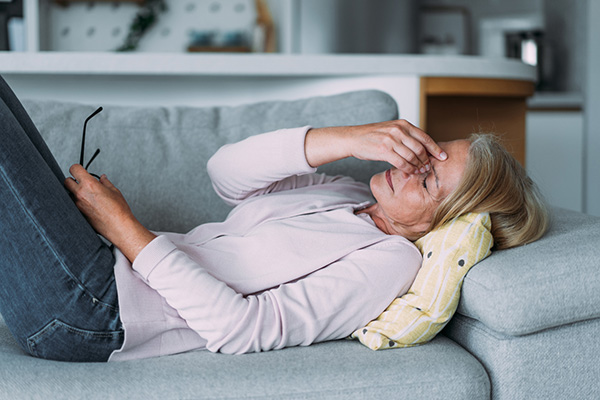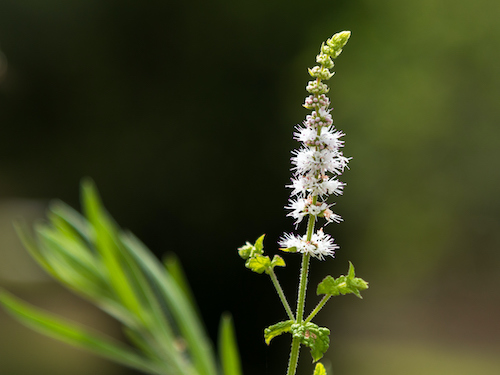Reviewed by Dr. Mary James, ND
Crashing fatigue is one of the most startling symptoms that women experience during perimenopause and menopause. If you’re in menopause, you may be familiar with the abrupt loss of energy, intense lethargy, and even muscle weakness that can overwhelm you at any time of day. Here’s how one woman described her crashing fatigue during menopause, “I could be fine one minute and the next minute I can’t keep my eyes open. Some days my head was so foggy I started to doubt myself at work. I would just feel so drained.”

Symptoms of Crashing Fatigue in Menopause
- Irritability
- Anxiety
- Difficulty concentrating
- Frequent hunger
- Inability to sleep well, waking up tired
- Racing thoughts at night
- Reduced enthusiasm about life
- Lack of motivation
- Feeling overwhelmed or emotionally stressed
Conventional doctors may be familiar with crashing fatigue in menopause, but they tend to prescribe antidepressants or narcolepsy drugs. These prescriptions merely provide a temporary Band-Aid solution — without addressing the root cause of your symptoms. In order to find real relief from crashing menopause fatigue, you have to know what’s causing it.
What causes crashing fatigue in menopause?
Hormonal Imbalance: During perimenopause and menopause, the body’s natural hormone balance — especially estrogen, progesterone, and testosterone — begins to weaken. The resulting imbalance can trigger uncomfortable symptoms like hot flashes, extreme fatigue, mood swings, weight gain, low libido, brain fog and more.
Increased Stress: These menopause hormonal imbalances often emerge at the same time as other midlife stressors reach a peak — pressure at work, caring for both children and aging parents, and sleep deprivation. When we experience chronic stress, every gland and organ becomes devoted to pumping out stress hormones called adrenaline and cortisol. And in the “cortisol steal,” this demand for cortisol scoops up the building blocks for other hormones. This means that your body has minimal resources left over to nourish thyroid and sex hormones, especially estrogen, progesterone and DHEA. Chronically elevated stress and high cortisol can have a devastating effect on your hormonal balance — especially during menopause.
Insomnia: Between hot flashes, night sweats, racing thoughts and weight gain, menopause symptoms can make a restful night’s sleep feel nearly impossible. Hormonal fluctuations also trigger cortisol release, which derails your normal circadian sleep cycle even further — as if crashing fatigue wasn’t bad enough!
The solution to crashing fatigue in 3 steps
If you’re experiencing crashing fatigue, you want to interrupt that pattern and reestablish your normal sleep-wake cycle. Careful attention to hormones can restore their natural rise-and-fall patterns and allow them to interact in a healthy way.
1. Correct your supplements.
Crashing fatigue is linked tightly to fluctuating estrogen levels, especially when the changes are severe or rapid. The correct balance between naturally declining estrogen and other hormones smooths out the hormonal spikes and crashes that drain energy and disturb sleep. Women in menopause are more vulnerable to the effects of stress and adrenal hormone responses. That means remembering to pace yourself during the day, and allowing for more time-outs as needed.
You can help your body coax its hormones back into balance using herbal extracts. The best formulas contain combinations of phyto-ingredients that have adaptogenic qualities that allow them to continually adjust as necessary. Look for red clover, ashwagandha and especially black cohosh — these shift naturally to the changing hormonal needs of your body and they function well together.
2. Correct your snack and caffeine routine.
Most women’s understandable impulse when they have crashing fatigue is to reach for sugary snacks and caffeine. But this only makes the underlying imbalance worse. Here’s what you can try instead: a. Swap out coffee in the afternoon with green or herbal tea, b. Try a high protein snack with healthy oils rather than simple carbs that cause a sugar spike and crash.

Eating regularly is important to fuel energy and prevent crashing fatigue. If you’re a meal skipper, you’ll need to change your ways, at least for a while. Eat every 3 to 4 hours throughout the day and keep snacks super simple, healthy and fast — but not junky.
Have snacks ready if you can and choose:
- Apple slices with almond butter (peanut butter works in a pinch)
- Pre-cut vegetables, hummus or baba ganoush and ½ whole wheat pita
- ½ cup plain yogurt with blueberries and walnuts
- Baked chips with guacamole
- Smoothie made with banana, blueberries, kale, protein powder and coconut water
A note about hydration: fatigue can be directly linked to low fluid status, so drink water whenever you think of it.
3. Correct your sleep routine.
The quality of your sleep depends on your daily life, but also what you do before you go to bed. The choices you make affect your hormones, especially the transition from daytime busy-ness to nighttime rest. Here’s a routine we recommend; you can modify it to suit your own life and unique needs:
- 3 hours before sleep: Put your life to bed
- Make the calls you need, clean the kitchen, think about the clothes for tomorrow, and then stop the busyness.
- 2 hours before sleep: Me Time
- Tea, bath, sewing, knitting
- Limit screen time; blue light in screens destroys the melatonin you need to sleep (don’t link out to our article)
- Don’t take care of other people
- 1 hour before sleep: Put yourself to bed
- Put yourself to sleep, consider reading or talking with your partner.
- Breathwork to relax the vagus nerve (link to breathwork and high blood pressure article until breathwork/vagus nerve article is ready)
The midlife transition can be a tough time, especially if you have crashing fatigue. There are effective ways to optimize how you feel in menopause, and they all start with prioritizing your own health and happiness. If crashing fatigue is running your life today, listen to your body and put these steps into action. They can guide you to restore natural sleep patterns, reclaim energy and become more productive.
Soon you’ll l feel like yourself again, and maybe even better.
https://www.everydayhealth.com/menopause/fatigue-and-menopause/
Crashing Fatigue. [Discussion forum] Available at: https://www.patient.co.uk/forums/discuss/crashing-fatigue-270742. Accessed January 12, 2015.
Fatigue. Menopause Centre, Australia. Available at: https://menopausecentre.com.au/Symptoms-Fatigue-menopause. Accessed January 12, 2015.
Burger HG, Hale GE, Robertson DM, Dennerstein L. A review of hormonal changes during the menopausal transition: focus on findings from the Melbourne Women’s Midlife Health Project. Hum Reprod Update. 2007 Nov-Dec;13(6):559-565.
Lipovac M, Chedraui P, Gruenhut C, et al. The effect of red clover isoflavone supplementation over vasomotor and menopausal symptoms in postmenopausal women. Gynecol Endocrinol. 2012 Mar;28(3):203-207.
Mishra LC, Singh BB, Dagenais S. Scientific basis for the therapeutic use of Withania somnifera (ashwagandha): a review. Altern Med Rev. 2000 Aug;5(4):334-346.
Shams T, Setia MS, Hemmings R, et al. Efficacy of black cohosh-containing preparations on menopausal symptoms: a meta-analysis. Altern Ther Health Med. 2010 Jan-Feb;16(1):36-44.
Glovinsky P, Spielman A. The Insomnia Answer. New York, NY: Preigree Trade; 2006. Available at: https://tinyurl.com/kth2ocu












